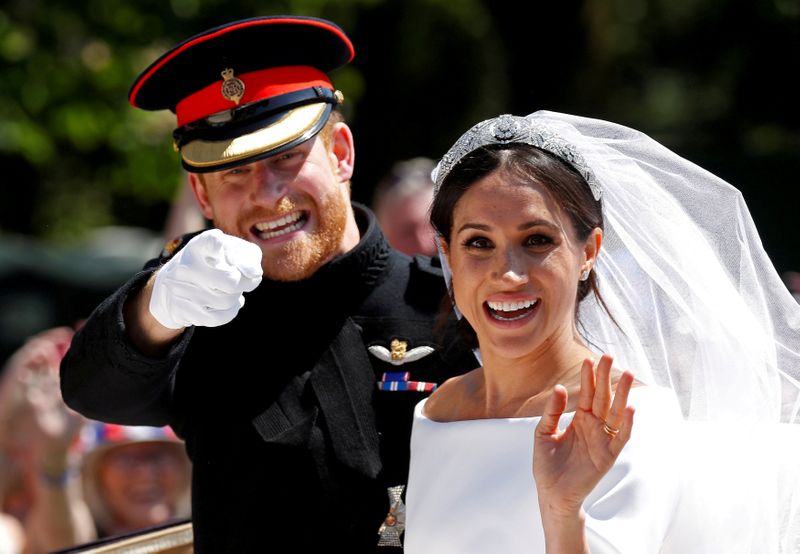By Elizabeth Howcroft
LONDON (Reuters) - Love them or loathe them, the British royals are peerless purveyors of news stories and there was no shortage of opinions in London on Thursday about Prince Harry and his wife Meghan's shock plans to strike out on their own.
Media headlines in Britain were mostly negative but members of the public in central London appeared more sympathetic to the couple's desire to step back from their roles as senior royals.
"After the time they've had with the British press, I think it's a good move for them," said Bobby Locke, the manager of a bar in central London, alluding to the pair's complaints of unfair and inaccurate coverage.
Locke said Harry's attempt to find a path for himself outside tightly controlled royal protocol was understandable, given his ill-defined status as younger sibling to a future monarch.
"Historically, it's usually the sibling of the future king that's the runaway one - Princess Margaret, Prince Edward, they all want to have their own lives because they're born into something they can't be," he said.
Since his elder brother Prince William had three children with his wife Kate, Harry has been pushed down to sixth in line to the throne.
But while the chance of a significant constitutional role for him has receded, his popularity has remained high, helped by his image as a creatable, emotionally articulate man.
"I like Harry. Harry's a good guy, he's more of an open guy than Will," said Zach Nur, a guide working on tourist buses.
He was supportive of the couple's decision to relinquish some of their royal duties and become financially independent, but less keen on their plan to spend more time in North America.
"I suggest to them, 'stay here rather than leaving the UK,'" he said. "Hopefully, they do stay here."
JOHN AND YOKO
Others were less interested in Harry and Meghan's wellbeing, but pleased that they would contribute to slimming down the monarchy, an institution regarded by some as costly and bloated.
"Personally speaking, the monarchy, I'd have the queen and the next in line, but the rest of them? Make a living for yourself!" said Tom Flannigan, a recruitment consultant from Scotland on a business trip to London.
His wife Helen, however, took a more negative view, blaming Meghan for disrupting Harry's life and especially his relationship with his brother - a take on the Windsor family saga favored by some newspapers.
"I think Harry's getting led. I think he'll regret it later in life," she said, bemoaning that the close bond between the brothers, cemented by the loss of their mother Princess Diana, appeared to have frayed.
Such comments received short shrift from American visitors, who took a more positive view of their compatriot Meghan.
Candice Fleming, from Chicago, accused the British media of scapegoating the former TV actress.
"There's a divorced American woman, making problems for the monarchy, here we go again," she said, alluding to the abdication crisis of 1936, when King Edward VIII renounced the throne to marry American divorcee Wallis Simpson.
"As an American I go, 'well, it's their life so that's good for them, what they think is best for them, for their family,'" said Fleming, adding that in her view Harry was more popular in the United States, "more beloved" than his relatives.
Eric Rohmann, also visiting from Chicago, drew a comparison with John Lennon and Yoko Ono, recalling how xenophobia drove much negative coverage of the Beatle's relationship with the Japanese artist.

"Why blame Meghan?" he said.